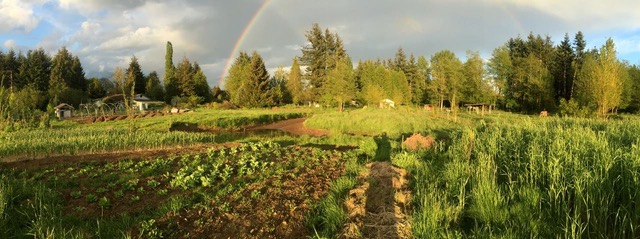
Brian Kerkvliet
Forum Replies Created
-
Brian Kerkvliet
MemberJanuary 22, 2024 at 6:55 pm in reply to: Monthly Cascadia Seed Guild Zoom SessionsYes I agree there is a place for landrace seed stewardship but that is after you have a good understanding on seed saving overall. There are ways you can really mess up if you are not paying attention. Carrots can cross with poison hemlock or queen annes lace. Corn can get GMO genes, squash can become toxic by crossing with gourds etc.
When beginning to teach people about this stuff it is best to start with the fundamental basics and then lead into more loose experimental approaches. This will give them an understanding of some of the potential hazards and benefits of open pollinated landrace approaches to seed saving.
Also if people are doing it for themselves that is one thing. If they are doing it to share or sell/trade with others that is a serious responsibility and quite another thing.
I alwase go with the precautionary principal. Just my thoughts on this
-
Brian Kerkvliet
MemberJanuary 22, 2024 at 4:20 pm in reply to: Monthly Cascadia Seed Guild Zoom SessionsThanks for this info Mike. After looking at it I feel that it is over simplified and can lead people down the wrong path. For instance corn is wind pollinated and can cross with any other corn within 2 miles. So isolation techniques or hand pollination is needed to insure that you don’t end up with GMO feed corn seed. Basically there are three categories of seed that you can save, easy, medium, and hard.
We could make a simple hand out but there is this one I would put out there as a primer that has already been made up by Seed Ambassadors here.
There are many other resources on saving seeds posted on the Salish Seed website and listed here.
- The Seed Garden: The Art and Practice of Seed Saving, edited by Lee Buttala, et al. Seed Saver’s Exchange, 2015.
- Seed to Seed: Seed Saving and Growing Techniques for Vegetable Gardeners, by Suzanne Ashworth. Seed Savers Exchange, 2002.
- Seed Sowing and Seed Saving by Carole B. Turner, Published by Story
- The Organic Seed Grower: A Farmer’s Guide to Vegetable Seed Production by John Navazio. Published by Chelsea Green, 2012.
- Saving Seeds: A Home Gardener’s Guide to Preserving Plant Diversity by Dan Jason. Salt Spring Seeds, 2020
- The Whole Organic Food Book: Safe Healthy Harvest From Your Garden To Your Plate, by Dan Jason. Raincoast Books, 2001.
- The Resilient Gardener: Food Production And Self-Reliance In Uncertain Times. by Carol Deppe. Chelsea Green, 2010. (Carol’s other books “Breed Your Own Vegetable Varieties” and “The Tao of Vegetable Gardening” are also excellent)
- Beautiful Corn: America’s Original Grain from Seed to Plate, by Anthony Boutard. New Society Publishers, 2012.
- Homegrown Whole Grains: Grow, Harvest, and Cook Wheat, Barley, Oats, Rice, Corn, and More, by Sara Pitzer. Storey Publishing, 2009.
-
Brian Kerkvliet
MemberJanuary 18, 2024 at 9:43 am in reply to: Welcome! Feel free to introduce yourself hereHi Brad,
Glad to have you here. There is a active group of people doing a variety of projects here in Bellingham and Whatcom county. Happy to help you get plugged in when you get settled and ready.
We are working on communication methods to keep folks informed on upcoming events. The best way at the moment is to join Transition Whatcom’s Ning site. there is a group there called regenerate Whatcom if you join that you will get notices of upcoming events. Eventually it will be easier to send out notices from this platform.
There is also http://www.whatcompermaculture.com and http://www.inspirationfarm.com where you can find out about a variety of community events.
Hope to meet you soon.
Brian
whatcompermaculture.com
Zone Zero = Home - Whatcom Permaculture
Permaculture In Whatcom County Learn the skills to work with nature to create integrated Permaculture systems of abundance and productivity! Food, Soil, Shelter, Energy, Water and a lot more: Design … Continue reading "Zone Zero = Home"
-
Brian Kerkvliet
MemberDecember 14, 2023 at 9:05 am in reply to: Sharing data base of Cascadia SeedsI think that is a good idea. Defiantly something to work on until Spring shows up.
It is easy enough for a local group or individual to keep track of their seeds on a spread sheet but if we want to share these across the region we need something more sophisticated. Web or app based, easy to use.
There is a friend here in Bellingham that is working on an app that will have some seed saving and sharing features in it. https://geogardenclub.com/docs/home/sneak-peek
geogardenclub.com
Mobile App Sneak Peek | Geo Garden Club
We are working on the alpha release of the GeoGardenClub mobile app, with an expected release date of early 2024. While the app is not yet ready for prime time, we thought it would be fun to show you some … Continue reading


